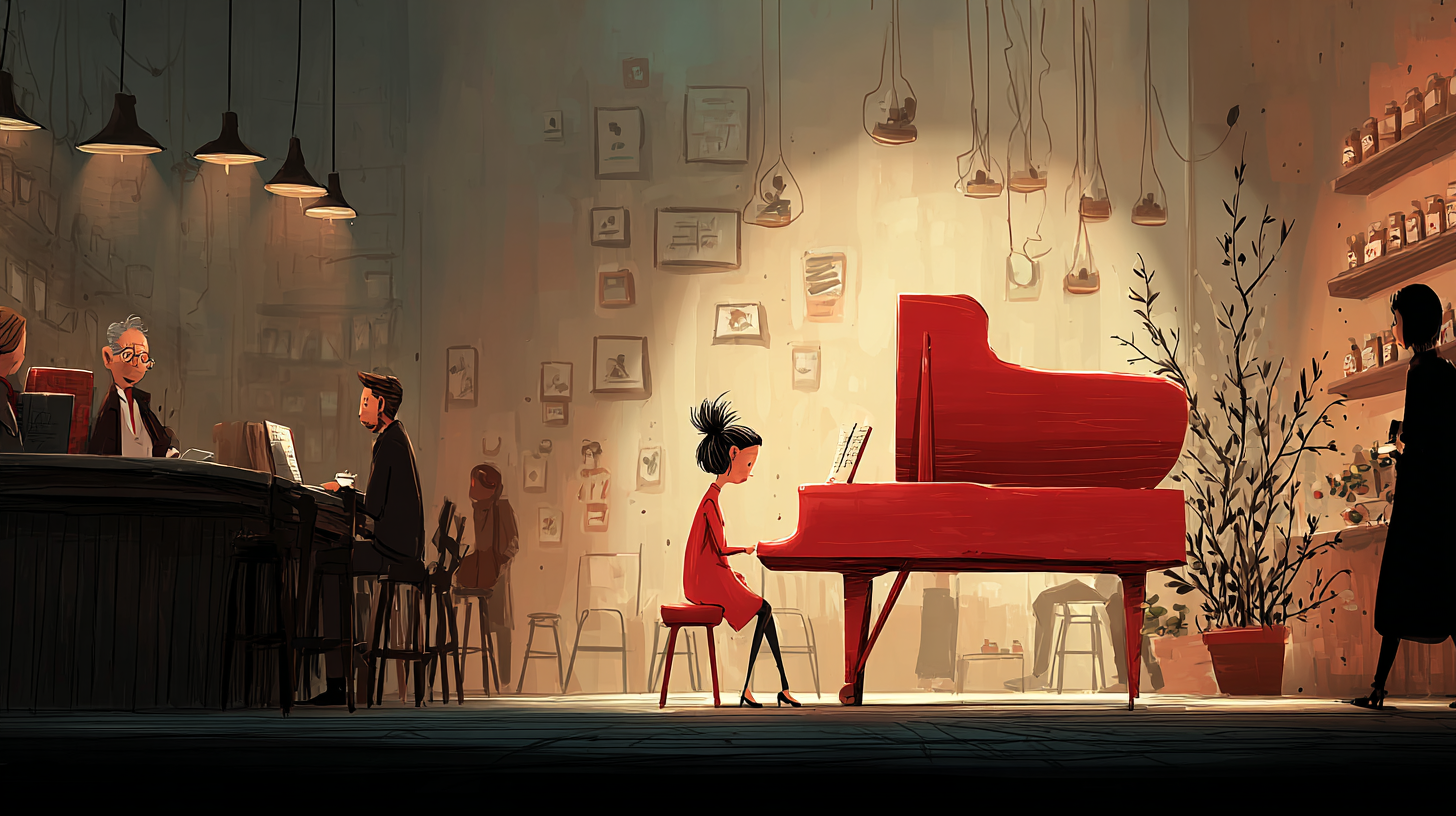Piano means a musical instrument or playing music quietly.
pianoは「楽器のピアノ」や「音楽で静かに」という意味がある。
以下は英単語 “piano” に関するストーリー型学習コンテンツです。まずは大枠の意味を理解して最後の文章で確認しましょう。
主な意味(main meaning)
| 品詞 | 発音記号 | 意味 | 英語例文 |
|---|---|---|---|
| 名詞 | /piˈænoʊ/ | ピアノ(鍵盤楽器) | She plays the piano beautifully. |
| 形容詞 | /piˈænoʊ/ | ピアノ(音楽用語:弱く、静かに) | The music begins piano and then grows louder. |
語源(etymology)
イタリア語 piano(「静かに」)に由来。
楽器の正式名称は pianoforte(弱くも強くも出せる楽器)から来ており、「弱い(piano)+強い(forte)」の意味を持つ。
核となるイメージは「音の強弱を表せる楽器、または静かな音」。
類義語(synonyms)
| 類義語 | 意味 | 例文 |
|---|---|---|
| keyboard | 鍵盤楽器 | He bought a new keyboard for his band. |
| organ | オルガン | The church organ sounded powerful. |
| synthesizer | シンセサイザー | She created unique sounds with her synthesizer. |
| forte (音楽用語) | 強く | The song changes from piano to forte suddenly. |
反義語(antonyms)
| 反義語 | 意味 | 例文 |
|---|---|---|
| forte (音楽用語) | 強く、大きく | The orchestra played forte to end the piece. |
| loud | 大きな音で | He spoke loud enough for everyone to hear. |
コロケーション(collocations)
| コロケーション | 例文 |
|---|---|
| play the piano | She learned to play the piano at the age of six. |
| piano lesson | He takes a piano lesson every Saturday. |
| piano music | I enjoy listening to piano music before bed. |
| grand piano | The concert hall had a beautiful grand piano. |
2項表現(binomials)
| 2項表現 | 例文 |
|---|---|
| black and white (piano keys) | The black and white keys of the piano looked shiny. |
| loud and quiet | The piano piece moved between loud and quiet parts. |
英語ストーリー(english story)
The Office Piano
In a modern office building, there was an old grand piano in the lobby. Most of the employees passed by it every morning, but few ever touched it. One day, a new employee named Anna noticed it and smiled. She had taken piano lessons for many years when she was younger, but since starting her career, she had little time for music.
One afternoon, when the office was quiet, Anna sat at the piano and began to play softly, or piano as the musical term described. The sound filled the lobby, and people who were working nearby stopped to listen. Some whispered, “Is that Anna playing?” Others simply enjoyed the piano music, which made the office atmosphere warmer.
Her manager, Mr. Smith, came down the stairs and listened. He said, “I didn’t know you could play the piano! This is wonderful.” Anna blushed and replied, “Yes, I used to play every week, but it has been a long time.” Mr. Smith encouraged her, “Why don’t you play during our Friday break time? Music will bring energy to the office.”
That Friday, Anna prepared a short program. She started with a soft song played piano, and then shifted suddenly to forte, filling the room with power. The contrast between loud and quiet notes surprised everyone. Some colleagues even compared the piano’s sound to a keyboard or a synthesizer, but they agreed the real piano was much richer.
After the performance, her co-worker James said, “I play the organ at my church. Maybe we could play together one day.” Anna laughed and agreed. The piano had created new friendships in the office.
From that day on, the piano in the lobby was no longer silent. Employees sometimes stopped to press a few of its black and white keys, and Anna often gave short performances. The workplace became not only a place for business but also a place for music, joy, and connection.
和訳
オフィスのピアノ
ある現代的なオフィスビルに、古い**グランドピアノ(grand piano)がロビーに置かれていました。社員たちは毎朝その前を通りましたが、弾く人はほとんどいませんでした。ある日、新入社員のアンナがそれに気づき、にっこり笑いました。彼女は若い頃、長年ピアノのレッスン(piano lesson)**を受けていましたが、仕事を始めてからは音楽の時間がほとんどありませんでした。
ある午後、オフィスが静かになったとき、アンナはピアノに座り、音楽用語でいう「弱く」を意味する**ピアノ(piano)で柔らかく弾き始めました。その音はロビーに広がり、近くで働いていた人たちは立ち止まりました。「あれはアンナが弾いているの?」とささやく人もいれば、ただピアノ音楽(piano music)**を楽しむ人もいました。雰囲気は一気に温かくなりました。
上司のスミスさんが階段を降りてきて耳を傾けました。「君が**ピアノを弾ける(play the piano)**とは知らなかったよ!素晴らしいね」と言いました。アンナは少し赤面し、「はい、昔は毎週弾いていましたが、ずっと遠ざかっていました」と答えました。スミスさんは「金曜日の休憩時間に演奏してみてはどうかな?音楽はオフィスに活力を与えてくれるよ」と勧めました。
その金曜日、アンナは短いプログラムを準備しました。最初は静かに**ピアノ(piano)で弾き、次に突然フォルテ(forte=強く)に変えて、部屋いっぱいに力強い音を響かせました。その大きな音と静かな音(loud and quiet)の対比は、みんなを驚かせました。同僚の中にはピアノの音をキーボード(keyboard)やシンセサイザー(synthesizer)**に例える人もいましたが、やはり本物のピアノの音は豊かだと一致しました。
演奏後、同僚のジェームズが言いました。「僕は教会で**オルガン(organ)**を弾いているんだ。いつか一緒に演奏しない?」アンナは笑って同意しました。ピアノはオフィスに新しい友情を生んだのです。
その日以来、ロビーのピアノはもう沈黙することはありませんでした。社員たちは時々**白と黒(black and white)**の鍵盤をたたき、アンナはよく短い演奏を披露しました。職場はビジネスの場であるだけでなく、音楽と喜び、つながりの場となったのです。
Q&A
Q: pianoとkeyboardの違いは何ですか?
A: pianoは弦をハンマーで叩いて音を出す生の楽器です。keyboardは電子楽器で、電気で音を出し、音色を変えたり録音したりできます。
Q: pianoとorganの違いは何ですか?
A: pianoは打弦楽器(弦を叩く)ですが、organは管に空気を通したり電子回路で音を出したりする鍵盤楽器です。音の響きはpianoが明るく短く、organは長く続きます。
Q: pianoとsynthesizerの違いは何ですか?
A: pianoはアコースティックな音を持つ伝統的な楽器です。synthesizerは電子的に音を合成でき、自然界にない音も作れます。
Q: pianoとforte(音楽用語)の違いは何ですか?
A: pianoは「弱く、静かに」という演奏指示で、forteは「強く、大きく」という意味です。音楽で対になる言葉です。
Q: piano musicとkeyboard musicはどう違いますか?
A: piano musicはピアノ独自の響きを生かした曲のことです。keyboard musicは電子音色を活かした曲で、ジャンルや表現の幅が広いです。
Q: play the pianoとpiano lessonはどう関係しますか?
A: play the pianoは「ピアノを弾く」という行為そのもの、piano lessonは「ピアノのレッスンを受ける」という学習の場を指します。
Q: grand pianoと普通のpianoはどう違いますか?
A: grand pianoは横に長い大型ピアノで、音が豊かでコンサートに向いています。普通のpiano(upright piano)は縦型で、家庭や学校に多く置かれます。
Q: black and white(piano keys)は何を指しますか?
A: pianoの白鍵(ドレミ…)と黒鍵(♯や♭の音)を合わせた表現です。楽器そのものの見た目を表しています。



コメント